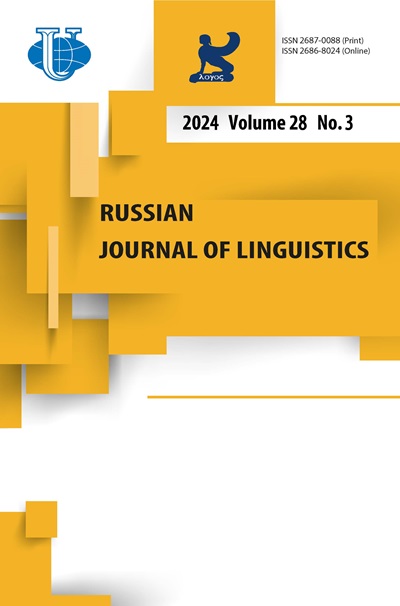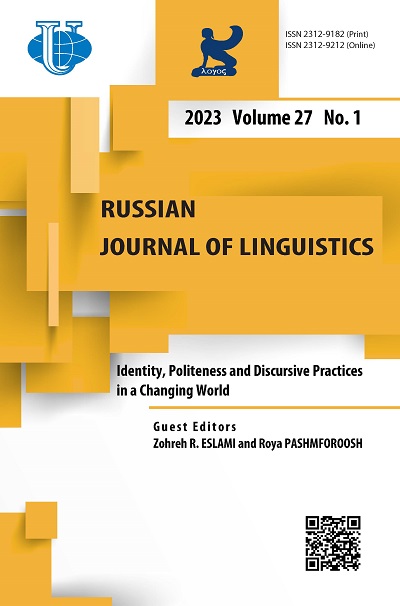Восприятие невежливости в речевом акте «отказ» и ответ на нее в английской и персидской коммуникативных культурах
- Авторы: Таджеддин З.1, Рассаэй Мокадам Х.2
-
Учреждения:
- Университет Тарбиат Модарес
- Квинслендский университет
- Выпуск: Том 27, № 1 (2023): Идентичность, вежливость и дискурсивные практики в меняющемся мире
- Страницы: 88-110
- Раздел: Статьи
- URL: https://journals.rudn.ru/linguistics/article/view/34228
- DOI: https://doi.org/10.22363/2687-0088-33391
- EDN: https://elibrary.ru/CJITDZ
Цитировать
Полный текст
Аннотация
Невежливость связана с использованием ликоугрожающих стратегий, приводящих к нарушению социального взаимодействия. Хотя в последние два десятилетия исследованию невежливости уделяется значительное внимание, восприятие невежливых высказываний и обратная реакция на них изучаются недостаточно. Цель данного исследования - выявить, как носители английского и персидского языков воспринимают невежливость в речевом акте «отказ» и как реагируют на нее. Для этого 90 носителям английского и 120 носителям персидского языков было предложено задание на завершение дискурса, содержащее восемь отказов, высказанных в вежливой форме либо с разной степенью невежливости. Результаты показали, что носители персидского языка ни один из отказов не посчитали невежливым, в то время как три отказа были восприняты как невежливые носителями английского языка. Реагируя на невежливость в отказе, носители английского языка использовали более разнообразные стратегии, чем носители персидского языка. Исследование показало, что социальная дистанция и отношения власти более значимы для носителей персидского языка, нежели английского; однако при ответе на невежливый отказ носители английского языка проявляли тенденцию к использованию стратегий нападения, включающих стратегии позитивной и негативной невежливости. Полученные результаты указывают как на сходства, так и различия в восприятии невежливости и ответной реакции на нее в разных культурах.
Ключевые слова
Об авторах
Зиа Таджеддин
Университет Тарбиат Модарес
Автор, ответственный за переписку.
Email: zia_tajeddin@yahoo.com
ORCID iD: 0000-0002-0430-6408
профессор прикладной лингвистики Университета Тарбиат Модарес, Иран. В сферу его исследовательских интересов входят педагогический дискурс, педагогическое образование и прагматика иностранного языка. Он (совместно с Т. Фэррелом) является редактором серии книг Studies in Language Teacher Education издательства Springer, соредактором двух международных журналов: Applied Pragmatics и Second Language Teacher Education. Автор статей, опубликованных в рецензируемых журналах, среди которых Journal of Language, Identity and Education, International Journal of Applied Linguistics, Language and Intercultural Communication и др., соредактор трех монографий.
ИранХоджат Рассаэй Мокадам
Квинслендский университет
Email: h.rassaeimoqadam@uq.net.au
ORCID iD: 0000-0002-1582-6636
аспирант факультета языков и культур Квинслендского университета, Австралия. Проводит исследование в области (не)вежливости и «лица» в персидском и английском языках с позиций интеракциональной прагматики, социопрагматики и межличностных отношений.
АвстралияСписок литературы
- Alemi, Minoo & Ashkan Latifi. 2019. The Realization of impoliteness in arguments between the Democrats and Republicans over the government shutdown issue in the US. Russian Journal of Linguistics 23 (1). 83-97.
- Archer, Dawn, Karin Aijmer & Anne Wichmann. 2012. Pragmatics: An Advanced Resource Book for Students. New York, NY: Routledge.
- Augoustinos, Martha & Iain Walker. 1995. Social Cognition: An Integrated Introduction. London: Sage.
- Austin, Paddy. 1990. Politeness revisited: The dark side. In Allan Bell & Janet Holmes (eds.), New Zealand Ways of Speaking English, 277-293. Clevedon: Multilingual Matters.
- Babai Shishavan, Homa & Sharifian Farzad. 2013. Refusal strategies in L1 and L2: A study of Persian-speaking learners of English. Multilingua: Journal of Cross-Cultural and Interlanguage Communication 32 (6). 801-836.
- Bolivar, Adriana. 2008. Perceptions of (im)politeness in Venezuelan Spanish: The role of evaluation in interaction. Pragmatics 18 (4). 605-633.
- Bousfield, Derek. 2007. Beginnings, middles and ends: A biopsy of the dynamics of impolite exchanges. Journal of Pragmatics 39 (12). 2185-2216.
- Bousfield, Derek. 2008. Impoliteness in Interaction. Amsterdam: John Benjamins.
- Bousfield, Derek & Miriam A. Locher (eds.). (2008). Impoliteness in Language: Studies on Its Interplay with Power in Theory and Practice. Berlin: Mouton de Gruyter.
- Brown, Penelope & Stephen C. Levinson. 1987. Politeness: Some Universals in Language Usage. Cambridge: Cambridge University Press.
- Culpeper, Jonathan. 1996. Towards an anatomy of impoliteness. Journal of Pragmatics 25 (3). 331-348.
- Culpeper, Jonathan. 2005. Impoliteness and entertainment in the television quiz show: The weakest link. Journal of Politeness Research: Language, Behaviour, Culture 1 (1). 35-72.
- Culpeper, Jonathan. 2010. Conventionalised impoliteness formulae. Journal of Pragmatics 42 (12). 3232-3245.
- Culpeper, Jonathan. 2011. Impoliteness; Using Language to Cause Offence. New York, NY: Cambridge University Press.
- Culpeper, Jonathan & Claire Hardaker. 2017. Impoliteness. In Jonathan Culpeper, Michael Haugh & Dániel Z. Kadar (eds.), Palgrave handbook of (Im)Politeness, 199-225. Basingstoke: Palgrave.
- Culpeper, Jonathan, Derek Bousfield & Anne Wichmann. 2003. Impoliteness revisited: With special reference to dynamic and prosodic aspects. Journal of Pragmatics 35 (10). 1545-1579.
- Culpeper, Jonathan & Vittorio Tantucci. 2021. The principle of (im)politeness reciprocity. Journal of Pragmatics 175. 146-164.
- Daly, Nicola, Janet Holmes, Jonathan Newton & Maria Stubbe. 2004. Expletives as solidarity signals in FTAs on the factory floor. Journal of Pragmatics 36 (5). 945-964.
- Demjén, Zsofia & Claire Hardaker. 2016. Metaphor, impoliteness, and offence in online communication. In Elena Semino & Zsofia Demjén (eds.), The routledge handbook of metaphor and language, 353-367. London: Routledge.
- Farnia, Maryam & Zahra Sheibani. 2019. Cross-cultural study of Iranian and English students’ impoliteness and threat responses. The Journal of English Language Pedagogy and Practice 12 (24). 69-91.
- Garcia-Pastor, Maria Dolores. 2008. Political campaign debates as zero-sum games: Impoliteness and power in candidates' exchanges. In Derek Bousfield & Miriam A. Locher (eds.), Impoliteness in Language: Studies on Its Interplay with Power in Theory and Practice, 110-123. Berlin: Mouton de Gruyter.
- Hatipoğlu, Çiler. 2007. (Im)politeness, national and professional identities and context: Some evidence from e-mailed ‘Call for Papers’. Journal of Pragmatics 39 (4). 760-773.
- Haugh, Michael. 2010. Intercultural (im)politeness and the micro-macro issue. In Anna Trosborg (ed.), Pragmatics across Languages and Cultures, 139-166. Berlin: De Gruyter Mouton.
- House, Juliane. 2012. (Im)politeness in cross-cultural encounters. Language and Intercultural Communication 12 (4). 284-301.
- Izadi, Ahmad. 2022. Intercultural politeness and impoliteness: A case of Iranian students with Malaysian professors. Journal of Research in Applied Linguistics 13 (2). 33-43.
- Lachenicht, Lance G. 1980. Aggravating language: A study of abusive and insulting language. Research on Language & Social Interaction 13 (4). 607-687.
- Lakoff, Robin. 1973. The logic of politeness: Or minding your P's and Q's. In Claudia Corum, Thomas Cedric Smith-Stark & Ann Weiser (eds.), Papers from the 9th Regional Meeting of the Chicago Linguistic Society, 292-305. Chicago, IL: Chicago Linguistics Society.
- Leech, Geoffrey Neil. 2014. The Pragmatics of Politeness. New York, NY: Oxford University Press.
- Lewandowska-Tomaszczyk, Barbara & Piotr Pęzik. 2021. Emergent impoliteness and persuasive emotionality in Polish media discourses. Russian Journal of Linguistics 25 (3). 685-704.
- Litvinova, Angela V. & Tatiana V. Larina. 2023. Mitigation tools and politeness strategies in invitation refusals: American and Russian communicative cultures. Training, Language and Culture 7 (1).
- Limberg, Holger. 2009. Impoliteness and threat responses. Journal of Pragmatics 41 (7). 1376-1394.
- Locher, Miriam A. & Tatiana V. Larina. 2019. Introduction to politeness and impoliteness research in global contexts. Russian Journal of Linguistics 23 (4). 873-903.
- Lugman, Erizal. 2022. Intercultural competence and (im)politeness during the intercultural adjustment period of Indonesian students in the UK. Unpublished Ph.D. thesis. Anglia Ruskin University.
- Mills, Sara. 2003. Gender and Politeness. Cambridge: Cambridge University Press.
- Mills, Sara. 2009. Impoliteness in a cultural context. Journal of Pragmatics 41 (5). 1047-1060.
- Mills, Sara, Andrew John Merrison & Aileen Bloomer. 2010. Impoliteness. In Patrick Griffiths, Andrew John Merrison & Aileen Bloomer (eds.), Language in use: A reader, 59-68. London: Routledge.
- Mullany, Louise. 2008. “Stop hassling me!” Impoliteness, power and gender identity in the professional workplace. In Derek Bousfield & Miriam A. Locher (eds.), Impoliteness in language: Studies on its interplay with power in theory and practice, 17-44. Berlin: Mouton de Gruyter.
- Nishida, Hiroko. 1999. A cognitive approach to intercultural communication based on schema theory. International Journal of Intercultural Relations 23 (5). 753-777.
- Schnurr, Stephanie, Meredith Marra & Janet Holmes. 2007. Being (im)polite in New Zealand workplaces: Māori and Pākehā leaders. Journal of Pragmatics 39 (4). 712-729.
- Sharifian, Farzad. 2011. Cultural Conceptualisations and Language: Theoretical Framework and Applications. Amsterdam: John Benjamins.
- Sharifian, Farzad & Tahmineh Tayebi. 2017. Perceptions of impoliteness from a cultural linguistics perspective. In Farzad Sharifian (ed.), Advances in cultural linguistics, 389-409. Singapore: Springer Nature.
- Spencer-Oatey, Helen & Wenying Jiang. 2003. Explaining cross-cultural pragmatic findings: Moving from politeness maxims to sociopragmatic interactional principles (SIPs). Journal of Pragmatics 35 (10). 1633-1650.
- Tajeddin, Zia, Minoo Alemi & Sajedeh Razzaghi. 2015. Cross-cultural perceptions of impoliteness by native English speakers and EFL learners: The case of apology speech act. Journal of Intercultural Communication Research 43 (4). 304-326.
- Teneketzi, Korallia. 2022. Impoliteness across social media platforms: A comparative study of conflict on YouTube and Reddit. Journal of Language Aggression and Conflict 10 (1). 38-63.
- Tracy, Karen & Sarah J. Tracy.1998. Rudeness at 911: Reconceptualizing face and face attack. Human Communication Research 25 (2). 225-251.
- Tzanne, Angeliki & Maria Sifianou. 2019. Understandings of Impoliteness in the Greek Context. Russian Journal of Linguistics 23 (4). 1014-1038.
- Xiang, Xia, Binghan Zheng & Dezheng Feng. 2020. Interpreting impoliteness and over-politeness: An investigation into interpreters' cognitive effort, coping strategies and their effects. Journal of Pragmatics 169. 231-244.
- Zidjaly, Najma Al. 2019. Divine impoliteness: How Arabs negotiate Islamic moral order on Twitter. Russian Journal of Linguistics 23 (4). 1039-1064.

















